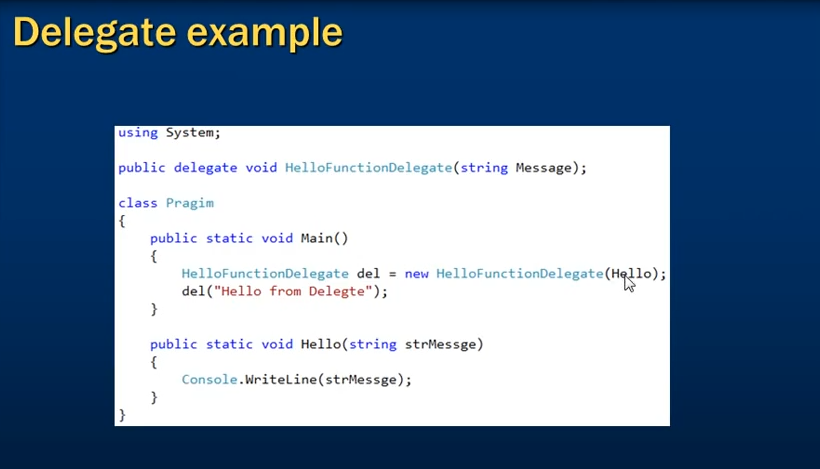Part 36 Delegates in c#


Part 37 Delegates usage in c#

class Progim { public static void Main() { List<Employee> empList = new List<Employee>(); empList.Add(new Employee() { ID = 101, Name = "Mary", Salary = 5000, Experience = 5 }); empList.Add(new Employee() { ID = 102, Name = "Mike", Salary = 4000, Experience = 4 }); empList.Add(new Employee() { ID = 103, Name = "John", Salary = 6000, Experience = 6 }); empList.Add(new Employee() { ID = 104, Name = "Todd", Salary = 3000, Experience = 3 }); Employee.PromoteEmployee(empList); } } class Employee { public int ID { get; set; } public string Name { get; set; } public int Salary { get; set; } public int Experience { get; set; } public static void PromoteEmployee(List<Employee> employeeList) { foreach (Employee employee in employeeList) { if (employee.Experience >= 5) //this is hard code logic, next part we will using delegete replace it. Console.WriteLine(employee.Name + "Promoted"); } } }
Part 38 Delegates usage in c# contiued

class Progim { public static void Main() { List<Employee> empList = new List<Employee>(); empList.Add(new Employee() { ID = 101, Name = "Mary", Salary = 5000, Experience = 5 }); empList.Add(new Employee() { ID = 102, Name = "Mike", Salary = 4000, Experience = 4 }); empList.Add(new Employee() { ID = 103, Name = "John", Salary = 6000, Experience = 6 }); empList.Add(new Employee() { ID = 104, Name = "Todd", Salary = 3000, Experience = 3 }); IsPromotable isPromotable = new IsPromotable(Promote); Employee.PromoteEmployee(empList,isPromotable); //Employee.PromoteEmployee(empList,emp=>emp.Experience>5); } //it unnecessary to use this method,you can use lambda expression to replace it. public static bool Promote(Employee emp) { if (emp.Experience > 5) return true; else return false; } } delegate bool IsPromotable(Employee empl); class Employee { public int ID { get; set; } public string Name { get; set; } public int Salary { get; set; } public int Experience { get; set; } public static void PromoteEmployee(List<Employee> employeeList, IsPromotable IsEligibleToPromote) { foreach (Employee employee in employeeList) { if (IsEligibleToPromote(employee)) //this is hard code logic, next part we will using delegete replace it. Console.WriteLine(employee.Name + "Promoted"); } } }
Part 39 Multicast Delegates in C#
A Multicast delegate is a delegate that has references to more than one function.When you invoke a multicast delegate, all the function the delegate is pointing to , are invoked.
There are 2 approaches to create a multicast delegate. Depending on the approach you use + or += to register a method with delegate
-or -=to un-register a method with the delegate
Note: A multicast delegate, invokes the methods in the invocation list, in the same order in which they are added.
if the delegate has a return type other than void and if the delegate is a multicast delegate, only the value of the last invoked method will be returned. Along the same lines, if the delegate has an out parameter, the value of the output parameter, will be the value assigned by the last method.
Common interview question - where do you use multicast delegates?
Multicast delegate makes implementation of observer(观察者) design pattem(模式) very simple. observer pattem is also called as publish/subscribe(订阅) pattem.
